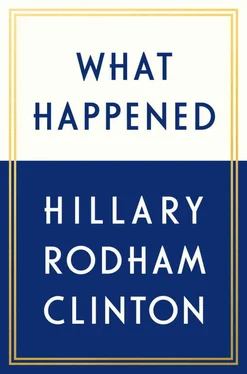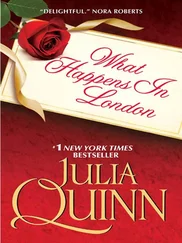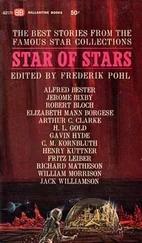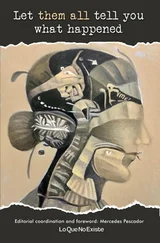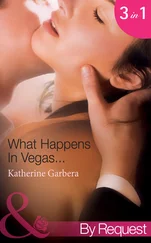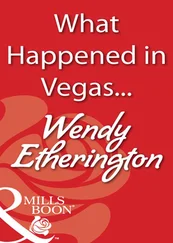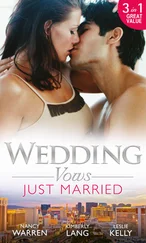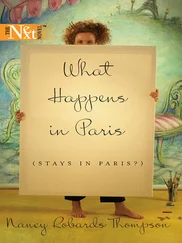It was impossible to ignore Trump—the media gave him free wall-to-wall coverage. I thought it was important to call him out for his bigotry, which I did early and often, starting when he called Mexican immigrants rapists and drug dealers the day he announced his candidacy. But it wasn’t until I saw him dominate a debate with a crowded field of talented Republican candidates—not with brilliant ideas or powerful arguments but with ugly attacks that drew gasps—that I realized he might be for real.
Now here he was, with his hand on the Bible, promising to preserve, protect, and defend the Constitution of the United States. The joke, it turned out, was on us.
It started to rain, and people around us fumbled with the thin plastic ponchos we’d been given. Backstage, I had urged Bill to wear his trench coat. The day was unusually warm, and Bill didn’t think he needed it. Now he was glad he’d worn it—a small wifely victory on a torturous day. As awkward as the ponchos looked, they could have looked worse. I had heard that the first batch of white ponchos that arrived could have looked something like KKK hoods from a certain angle, and a sharp-eyed inaugural organizer quickly replaced them.
The new President’s speech was dark and dystopian. I heard it as a howl straight from the white nationalist gut. Its most memorable line was about “American carnage,” a startling phrase more suited to a slasher film than an inaugural address. Trump painted a picture of a bitter, broken country I didn’t recognize.
I knew we still had real challenges, ones I had talked about endlessly on the campaign trail: income inequality and the increasing concentration of corporate power, continuing threats from terrorism and climate change, the rising cost of health care, the need to create more and better jobs in the face of accelerating automation. The American middle class really had gotten screwed. The financial crash of 2008–2009 cost them jobs and ripped away their security. It seemed like no one was ever held accountable. Americans across a broad spectrum felt alienated, from culturally traditional white voters unsettled by the pace of social change, to black men and women who felt as if the country didn’t value their lives, to Dreamers and patriotic Muslim citizens who were made to feel like intruders in their own land.
Trump was great at rubbing salt in their wounds. But he was wrong about so much. There had been seventy-five straight months of job growth under President Obama, and incomes for the bottom 80 percent were finally starting to go up. Twenty million more people had health insurance thanks to the Affordable Care Act, the greatest legislative achievement of the outgoing administration. Crime was still at historic lows. Our military remained by far the most powerful in the world. These are knowable, verifiable facts. Trump stood up there in front of the world and said the exact opposite—just as he had throughout the campaign. He didn’t seem to see or value any of the energy and optimism I saw when I traveled around the country.
Listening to Trump, it almost felt like there was no such thing as truth anymore. It still feels that way.
My predecessor in the Senate, Daniel Patrick Moynihan, used to say, “Everyone is entitled to his own opinion, but not his own facts.” We can disagree about policies and values, but claiming that 2 + 2 = 5 and having millions of Americans swallow it is very different. When the most powerful person in our country says, “Don’t believe your eyes, don’t believe the experts, don’t believe the numbers, just believe me,” that rips a big hole in a free democratic society like ours. As Yale history professor Timothy Snyder writes in his book On Tyranny: Twenty Lessons from the Twentieth Century , “To abandon facts is to abandon freedom. If nothing is true, then no one can criticize power, because there is no basis upon which to do so. If nothing is true, then all is spectacle.”
Attempting to define reality is a core feature of authoritarianism. This is what the Soviets did when they erased political dissidents from historical photos. This is what happens in George Orwell’s classic novel Nineteen Eighty-Four , when a torturer holds up four fingers and delivers electric shocks until his prisoner sees five fingers as ordered. The goal is to make you question logic and reason and to sow mistrust toward exactly the people we need to rely on: our leaders, the press, experts who seek to guide public policy based on evidence, ourselves. For Trump, as with so much he does, it’s about simple dominance.
This trend didn’t start with Trump. Al Gore wrote a book called The Assault on Reason in 2007. In 2005, Stephen Colbert coined the word “truthiness,” inspired by how Fox News was turning politics into an evidence-free zone of seething resentments. And the Republican politicians whom Fox propelled to power had done their part, too. Republican strategist Karl Rove famously dismissed critics who lived in “the reality-based community”—words intended as a slight—saying they failed to grasp that “we’re an empire now, and when we act, we create our own reality.”
But Trump has taken the war on truth to a whole new level. If he stood up tomorrow and declared that the Earth is flat, his counselor Kellyanne Conway just might go on Fox News and defend it as an “alternative fact,” and too many people would believe it. Just look at what happened several weeks into his presidency when Trump falsely accused President Obama of having wiretapped him, a claim that was widely and quickly debunked. A subsequent poll found that 74 percent of Republicans nevertheless thought it was at least somewhat likely to be true.
Trump’s inaugural address was aimed squarely at millions of Americans who felt insecure and frustrated, even hopeless, in a changing economy and society. A lot of people were looking for someone to blame. Too many saw the world in zero-sum terms, believing that gains made by fellow Americans they viewed as “other”—people of color, immigrants, women, LGBT people, Muslims—were not earned and must be coming at someone’s expense. The economic pain and dislocation were real, and so was the psychic pain. It made for a toxic, combustible mix.
I hadn’t been blind to the power of this anger. During the campaign, Bill and I both went back and reread The True Believer , Eric Hoffer’s 1951 exploration of the psychology behind fanaticism and mass movements, and I shared it with my senior staff. On the campaign trail, I offered ideas that I believed would address many of the underlying causes of discontent and help make life better for all Americans. But I couldn’t—and wouldn’t—compete to stoke people’s rage and resentment. I think that’s dangerous. It helps leaders who want to take advantage of that rage to hurt people rather than help them. Besides, it’s just not how I’m wired.
Maybe that’s why Trump was now delivering the inaugural address and I was sitting in the crowd.
What would I have said if it were me up there? It would have been daunting to find the words to match the moment. I probably would have gone through a million drafts. My poor speechwriters would have been sprinting only steps ahead of me carrying the thumb drive with the final draft to the teleprompter operator. But I would have relished the chance to move beyond the rancor of the campaign, reach out to all Americans regardless of who they voted for, and offer a vision of national reconciliation, shared opportunity, and inclusive prosperity. It would have been an extraordinary honor to be the first woman to take the oath. I won’t pretend I hadn’t dreamt of that moment—for me, for my mother, for my daughter, her daughter, everyone’s daughters—and for our sons.
Instead, the world was listening to the new President’s undimmed fury. I remembered the late Maya Angelou reading one of her poems at Bill’s first inauguration. “Do not be wedded forever to fear, yoked eternally to brutishness,” she urged us. What would she say if she could hear this speech?
Читать дальше
